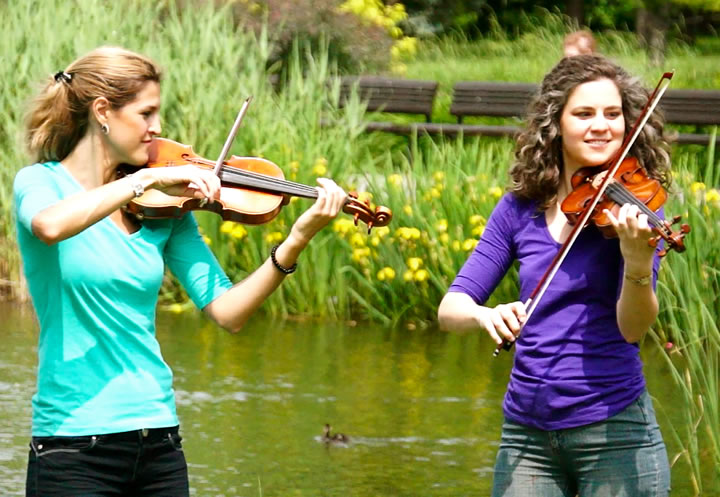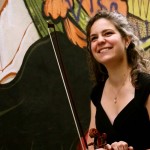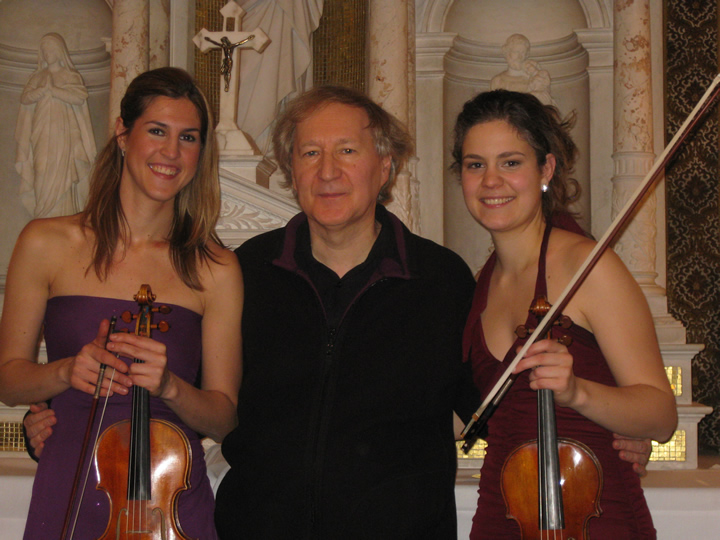Last week we sat down with violinists Caroline Chéhadé and Ana Drobac, the two halves of the Montreal-based Duo Philia. They discussed how they got started in music, their first meetings, and the nearly decade long time period in which collaboration of these two musicians blossomed into what it is today. In addition, we saw their fantastic work with Ovation Press editor Helmut Lipsky.
In the concluding part of this interview set, Ms. Chéhadé and Ms. Drobac talk about where they see themselves – and their duo – going into the future, as well as their thoughts on aspiring professional musicians in today’s world.
—Colin Cronin, Creative Director
String Visions: So what is in store next for Duo Philia? Where do you see this small ensemble headed?
Ana Drobac: I think what we would like to do is play more concerts and eventually do some stuff with orchestra. For sure we want to be able to collaborate with other chamber musicians – with pianists, violinists, and other ensemble types. We’ll see. The challenge is that the repertoire for violin duo is so limited. We will have to do a lot of arrangements.
For two violins, there is a lot of formative and junior-level literature for younger students. These are ideal for building up the foundational skills in musicians, but for us it obviously does not work for most of what we are trying to do. It’s been a challenge to find more works that are appropriate to our level, and the level of our audiences.
Maybe if someone reads this interview they will be inspired to write something for us! *laughs*
String Visions: *laughs* Chicago is really big on new music as I’m sure you know. Ensembles such as eighth blackbird and Dal Niente play a large role in commissioning the works of new and emerging composers. Maybe you can find something down here!
Caroline Chéhadé: That would be awesome.
String Visions: Are you both primarily performers or do you do composing / arranging yourself?
Ana Drobac: Not too much. I do a little bit – not seriously. For example, recently I played with a circus company and I had to arrange something for my student and I. It was fairly simple. But I’m actually thinking about getting more into it because there are many works that I would love to arrange for two violins. That would of course give us more repertoire to work with.
String Visions: Caroline how about you?
Caroline Chéhadé: I’m mostly a performer. I don’t really see myself going the direction of composing. As I said, I don’t really play any other instruments. I prefer to stick to the violin and performance.
String Visions: I see. What other musical activities are both of you involved in?
Ana Drobac: I have jobs in a few orchestras in Montreal, and I sub with many more. I also teach quite a bit. I have a big passion for teaching… I even teach Caroline’s mom! *laughs*
Caroline Chéhadé: That’s true!
Ana Drobac: I also have a string quintet (with bass). And I really like this recent gig with the circus… I think I’ll try out for Cirque du Soleil… *laughs* I’m kidding.
But I enjoy playing with different artists and with more distinctive ensembles. Everyone tries to play with orchestra, and while it’s a great experience, it’s so… normal. Everyone expects you to do it. I find I’m drawn to exploring more non-traditional projects to try out different things.
String Visions: Is that the same with you Caroline?
Caroline Chéhadé: Yes I am also involved in many different performing groups. I don’t teach as much; really only in the summer. I do enjoy playing with orchestra, but I am very open to trying out anything that comes my way. I’m very project-oriented. For instance, I put together a show – Confidences d’un Stradivarius – which not only included rehearsal and learning my music, but also all the administrative aspects of it. It takes a lot of time for one person to handle all of these different elements that go into a production like this.
Basically this show was put together because I won the use of a Stradivarius violin for three years. Following that, some friends of mine undertook an enormous research project on the history of this particular violin: from its fabrication until today. That provided the setting to our show in which this specific instrument tells a story in music (and in words too) from Bach to the composers of today.
This is part of the Canada Council for the Arts Musical Instrument Bank. They lend their violins and cellos for a period of three years at a time. Amongst them, they have three violin strads, 1 cello strad and 1 del Gesu violin… and many more (Gagliano, Montagnana, Vuillaume, Scarampella, Rocca, etc.)
I recorded that show and am putting together a video promo to awaken interest in producers. So, you can see how project-oriented I am. I love soloing with orchestra, I love chamber music… sometimes I’ll play in the orchestra… that’s nice too *Ana Laughs* but that’s not what I prefer.
One day I know I’ll teach more than I do now, but at the moment I am very satisfied with this lifestyle.
String Visions: That reminds me a lot of other musicians that I’ve interviewed before. For example, Colin Jacobsen of the Knights said many of the same things in terms of a project-oriented lifestyle for musicians. On the one hand, it almost has to be that way these days because it is so difficult to land a full-time orchestra job that pays you a good enough salary that you can make that your sole musical pursuit.
But on the other hand, I’m finding that many musicians also enjoy having the freedom and opportunity to pursure multiple musical projects at once. Often they seem to find their time spent with each ensemble, group, or project is much more effective this way.
Caroline Chéhadé and Ana Drobac: Yes definitely!
String Visions: With all of these different ensembles that you work with, do you have a favorite ensemble type? A setting you are best able to communicate your ideas to the audience?
Caroline Chéhadé: The violin duo is actually not the ensemble that I find most effective, or even my first choice. The drawbacks to it, as Ana said, have to do with what has been written and in what way it needs to be played to communicate what it has to say most effectively to the audience. There is obviously a need for a violin duo; for example, the duos that Lipsky wrote call for a violin duo. Sometimes, if you don’t have the right ensemble for the job, you can arrange it in a way that still preserves (or enhances) the original message. But ultimately whether or not a particular ensemble type is effective often rests upon the music that was written and what it has to say.
There is one ensemble type that I do favor a little more over others: the chamber orchestra. I would love to have a part to play in a chamber orchestra one day. It brings together the greatest traditions of both orchestra and chamber ensembles. I love the orchestra breadth, but I love the proactivity and leadership the musicians have to demonstrate in a chamber group. They become responsible for every idea. They have to take part in the music. Personally I love that.
String Visions: How about you Ana?
Ana Drobac: I would echo what Caroline said about the importance of what has been written for the ensemble, but I also think it depends on who you are playing with. If you are with people who are… let’s say “unkind”… *laughs* then you probably won’t like it even if the music is the greatest in the world. But, if you are with others that you enjoy playing with, and there is good musical rapport and connection in the group, then almost any ensemble can be fun and effective.
Personally I think the smaller the better. It is often difficult for musicians to collaborate, especially as a group gets bigger, our ego and other things get in the way. Something small that you say can unintentionally set another person off, and if you yourself are not open to feedback, you can easily get offended and cranky. All of this can disrupt the cohesion and effectiveness of a group in its main purpose, which is to play music.
I believe that’s why smaller groups, like chamber orchestras are great. I prefer them.
Caroline Chéhadé: We have the same idea in this area.
String Visions: Thanks for sharing your thoughts on this. It’s always a very interesting conversation to have with musicians regarding what ensemble types they like to play in.
I’ve really enjoyed our time to talk with each other. As we close out, I would like to ask what you would say to aspiring professional and amateur musicians to help them organize their own musical projects, something that both of you have proven to be exceptionally good at.
Ana Drobac: Absolutely. I have very strong feelings about this. When you finish school and don’t have a job, the world seems so big and it can get very overwhelming. You just have to remember and believe that there is a place for everyone. Listen to your heart and know that there is something that is meant for you. Not everyone has to win a job in the NY Philharmonic. And if you miss an opportunity or don’t get something, it doesn’t make you worth any less as a musician or a person. It’s just something that isn’t meant to be for you.
I would say that it is important to really look inside yourself and understand why you became a musician. What is the goal you aim to achieve in music. For me, I feel as if I was born to be a teacher. Teaching comes very naturally for me, and I get so much joy out of it. I can teach 10 hours without a break and still come out so happy and fresh after I’m all done.
String Visions: That’s really great.
Ana Drobac: I would also say that you need to put yourself out there and try different things in different ways. If you find that something isn’t working, try something else. I really encourage people to start their own musical projects and not just conform to what everyone might be telling you to do. Especially in the US, there are so many of these high-level conservatories and so much pressure on the auditions. They almost make you feel as if there is nothing more important. I’m not saying these aren’t important, because they are. But at the same time, that path may not necessarily be the right for you. You shouldn’t let something like that determine your happiness. Some people get so down on themselves and they realize afterwards that they were much happier before they put themselves through that process.
And remember that just because you win a job in some big philharmonic, it won’t automatically and instantly make you happy. You have to understand why you want certain things and above all not forget why you became a musician. Even if I’m in the middle-of-nowhere-Canada, in Carnegie Hall, or back home in Serbia, I’ll be happy with music.
Caroline Chéhadé: I can relate to everything that Ana said. Always reach out for the best and never settle. Maybe no one will notice if you are settling, but you will know it and that is what’s important. It will bring much less fulfillment if you compromise with yourself in this way.
One thing I would add, that I wish more students would be taught, is the most challenging thing that I have had to learn (and that I’m still learning): how to become your own teacher, beyond being a violinist teaching yourself (and others) violin. In the real world you have to learn so many skills to be versatile, and since you’re not at school anymore, you have to push yourself in order to grow. You have to be responsible for this if you want to improve.
You must learn how to become your own teacher, as a violinist, but also as an administrative person or a manager… depending on what you want to do. You need to learn how to continually improve yourself. That’s how musicians can be more successful. You will have to be good at contacting others, connecting with other organizations, building organizations, finding people to build websites and produce videos, etc. I’ve found that these sorts of things are some of the most difficult things I’ve had to learn how to do. I would encourage students and young professionals just out of school to be diligent about this. It is critical for those who really want to be successful as professional musicians, because all of these elements are part of the world we are in now.
It shouldn’t be discouraging. If students were taught that this is a reality (especially early on), then they would probably be less afraid of tackling these challenges.
By becoming your own teacher in so many ways you have to be able to critically analyze your playing, as well as your tendencies with other people and your ability to adapt to changing circumstances. You have to be able to identify problems or character traits that might impede you or your efforts. To know yourself and be able to channel your latent creative energies in the proper way is key.
String Visions: That is fantastic. Thank you both for sharing those thoughts with us.
Ana Drobac: Thank you for this opportunity. And please give our sincere gratitude and appreciation to Mr. Lipsky for giving us the opportunity to play, perform, and record his music. We learned a lot in working with him, and I feel that he may have been similarly inspired by our playing that he was able to return that inspiration in the work he did with us.
Caroline Chéhadé: Yes I would add that one of the things I admire most about him is the ease in which he plays with style. He has been very generous to share this knowledge with us; we’ve learned so much from him. His music very much comes to life when he plays it.
Ana Drobac: Absolutely! We definitely try our best to play it in the spirit of how it was composed, but to be able to receive that knowledge and experience directly from him… that musical insight into his music has helped us to grow in many ways. It’s really quite amazing and we have such great admiration and appreciation for his music and all the time he has spent with us.
String Visions: We look forward to seeing what the future holds for both of you and Duo Philia. Thank you for your time.
Caroline Chéhadé and Ana Drobac: Thank you as well!
This concludes our interview with the inspiring Duo Philia. This series wraps up with a feature Score Spotlight on Helmut Lipsky’s work Voyage à deux, a multi-volume set to which all the pieces recorded by Duo Philia belong. You can also check out these scores on Mr. Lipsky’s Ovation Press editor profile.



















No comments yet.